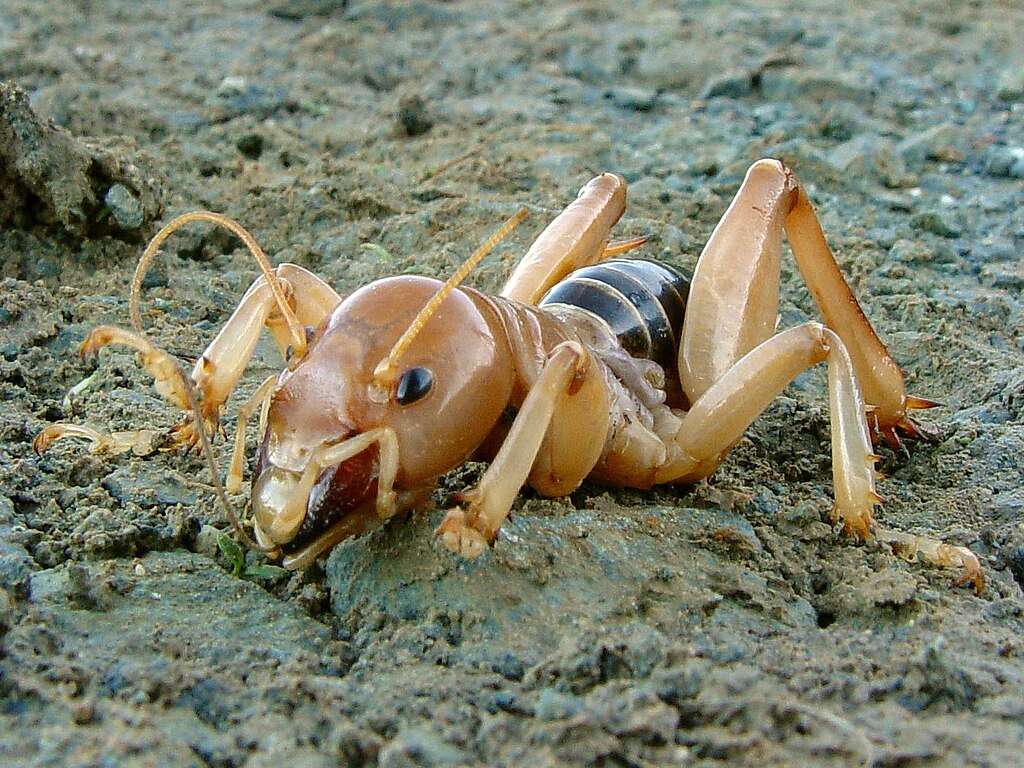Jerusalem Crickets

Appearance:
Jerusalem crickets (Stenopelmatus fuscus) are large insects, distinct for their striped dark brown bands across their body. Their head is notably massive and cream-yellow underneath, giving them a unique appearance often described as “baby-faced.” These wingless crickets have spiny legs and strong jaws, but despite their intimidating look, they are generally harmless.
Biology
These crickets are much larger than house or field crickets. They are nocturnal and thrive in dark, moist environments. You’ll commonly find them hiding under stones, logs, bricks, or boards during the day. They come out at night in search of food, primarily feeding on decaying plant and animal matter, as well as root crops like potatoes and radishes, which earns them the nickname “potato bugs.”
Mating occurs in the spring, after which females lay small masses of eggs in the soil. These crickets are not typically household pests, but they may wander inside homes occasionally.
Jerusalem Cricket Control
While these insects don’t pose serious threats to your home, they can be a nuisance. Control measures are relatively simple. Ensure that garden debris, rocks, and logs are properly cleared to reduce hiding places. In agricultural settings, crop rotation and soil health management can minimize their impact on root crops. If they enter your home, sealing cracks and gaps in walls or foundations will help prevent indoor encounters.
Treating can be effectively done using a residual granular insecticide, such as Talstar PL Granules. These granules can be applied to areas where crickets are commonly found, like garden beds, beneath rocks, and other outdoor hiding spots. The slow-release formula provides long-lasting protection, ensuring that the crickets are killed on contact and future infestations are controlled. Many granular insecticide products, including Talstar PL, are safe for use around edible gardens, so you can protect your plants and crops while keeping pests at bay. Always follow the product label for application instructions.
For severe infestations or to avoid potential bites, professional pest control services may be necessary.
Frequently Asked Questions (FAQs)
1. Are Jerusalem crickets dangerous?
No, Jerusalem crickets are not dangerous. While they may bite if handled roughly, their bite is not venomous or harmful to humans.
2. Why are they called “potato bugs”?
They are often found feeding on root vegetables like potatoes, hence the nickname.
3. What do Jerusalem crickets eat?
They primarily eat decaying organic matter but may also consume root crops like potatoes and radishes.
4. Do Jerusalem crickets come indoors?
Though they prefer outdoor habitats, they can occasionally wander indoors in search of shelter.
5. How can I prevent Jerusalem crickets from entering my home?
Seal any cracks or gaps in your home’s foundation, and keep outdoor areas clean of debris where they may hide.
6. When are Jerusalem crickets most active?
They are nocturnal and are most active at night, especially during warmer months.
7. Can Jerusalem crickets fly?
No, they are wingless and do not fly.
8. Do they damage crops?
Yes, Jerusalem crickets can damage root crops like potatoes and radishes.
9. How do I get rid of Jerusalem crickets in my garden?
Reduce clutter in your garden, remove hiding spots, and consider professional pest control for significant infestations.
